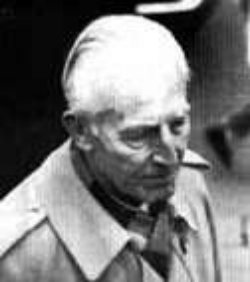Wilhelm Stäglich
| " Holocaust denier" ( Historical revisionist) | |
|---|---|
 | |
| Born | 11 November 1916 |
| Died | 5 April 2006 (Age 89) |
| Nationality | German |
| Victim of | |
| Interests | “The Holocaust” |
World war II army officer,judge, historian and important revisionist writer | |
Dr Wilhelm Stäglich (11 November 1916 - 5 April 2006 ) was a World war II army officer, German judge and an important revisionist writer, most notably for his detailed study, Der Auschwitz-Mythos.
Disturbed by the glaring discrepancies between what he had witnessed as an army officer during the war at Auschwitz, and by the portrayal of the camp that emerged after the war, he resolved - after years of silence - to speak out, and to undertake a serious investigation of the subject.
As punishment for a revisionist essay, he had written, he was dismissed as a judge in 1975 by court order, and forced into early retirement with a reduction of his pension.
His book, Der Auschwitz-Mythos, was published in March 1979 by the Grabert Verlag of Tübingen. The book is a systematic, critical examination of the documents, testimonies, confessions and personal accounts that portray Auschwitz as a center of programmatic extermination by gassing and other means. As its title suggests, it concludes that the Official Narrative of these evens is indeed a myth with hardly any foundation in reality. The book was published before the German "Holocaust denial" laws were passed and was a key factor in their formulation. Nevertheless, it was banned by the German authorities soon after publication, and in 1983 - after the legislation was passed - German police raided its publisher's offices and confiscated the remaining unsold copies.
A Document by Wilhelm Stäglich
| Title | Document type | Publication date | Subject(s) | Description |
|---|---|---|---|---|
| File:Auschwitz - A judge looks at the evidence.pdf | Book | March 1979 | Auschwitz-Birkenau "The Holocaust" | A systematic, critical examination of the documents, testimonies, confessions and personal accounts relating to Auschwitz as a center of programmatic extermination by gassing and other means |